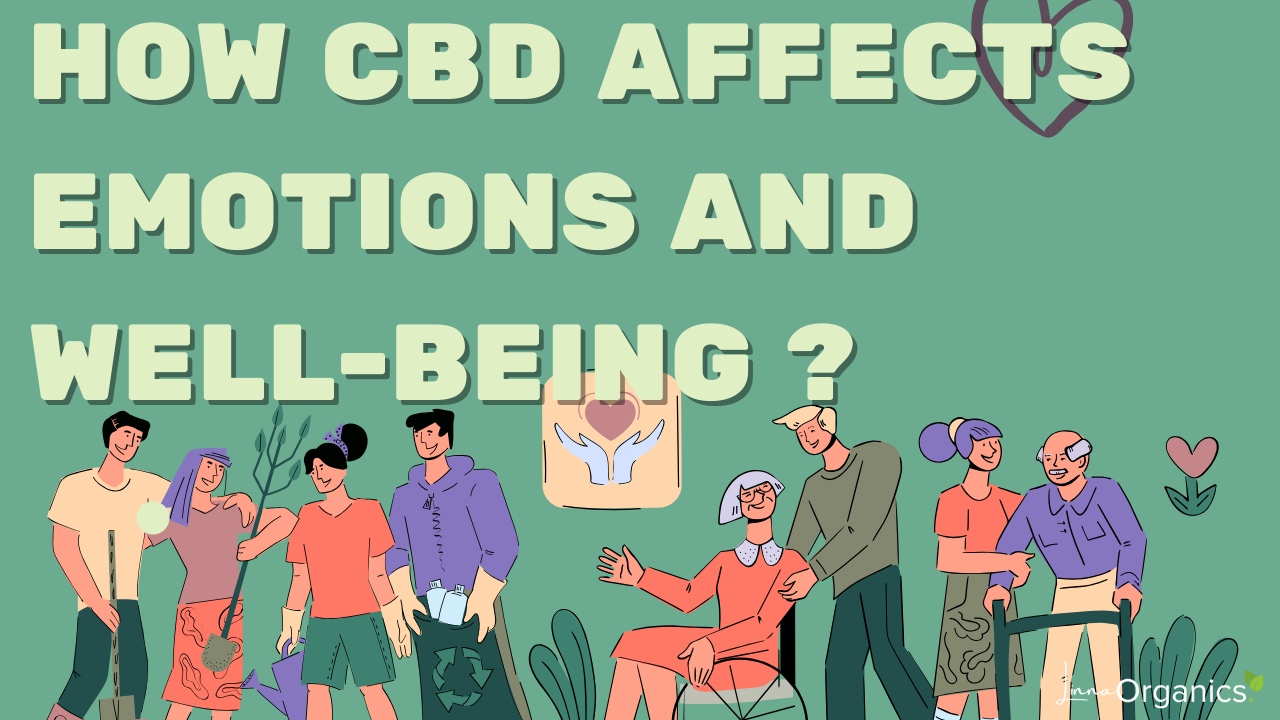- Your cart is empty
- Continue shopping
Understanding Cannabidiol (CBD): How It Affects Emotions and Well-being
-
Georgi Ivanov
- Posted on
- Categories:Blog

In the search for emotional balance, a natural element called cannabidiol (CBD) is gaining attention. Let’s explore how CBD might influence emotions and overall well-being, even for those unfamiliar with its potential.
What is CBD and How Does It Work?
CBD, or cannabidiol, is a naturally occurring compound extracted from the cannabis plant. Unlike its counterpart THC (tetrahydrocannabinol), CBD doesn’t induce psychoactive effects or a “high.” Instead, it operates within our body’s intricate endocannabinoid system (ECS), which is responsible for regulating various physiological functions, including mood, sleep, appetite, pain sensation, and immune response.
The ECS comprises cannabinoid receptors (CB1 and CB2) spread throughout the central and peripheral nervous systems. When CBD enters the body, it interacts with these receptors, modulating their activity rather than directly binding to them. CBD’s indirect influence on the ECS receptors, enzymes, and neurotransmitters potentially aids in restoring balance and harmony within the body, fostering homeostasis.
Studies suggest that CBD’s impact extends beyond the ECS, interacting with other receptor systems, such as serotonin receptors, which play a pivotal role in mood regulation. By influencing these receptors and neurotransmitters, CBD might assist in managing stress and anxiety levels without causing the intoxicating effects typically associated with cannabis.
Supporting Stress and Anxiety Management
Amid the complexities of modern life, stress and anxiety have become common afflictions affecting mental well-being. CBD has garnered attention for its potential in alleviating these emotional struggles. Scientific research indicates that CBD may influence the brain’s receptors associated with managing stress responses. When introduced into the body, CBD interacts with the endocannabinoid system (ECS), potentially modulating the activity of cannabinoid receptors.
This modulation could impact the brain’s signaling pathways related to stress response, offering a potential sense of calmness and relaxation. What sets CBD apart from traditional anxiety treatments is its purported ability to induce these calming effects without inducing the sedative or euphoric sensations associated with conventional medications.
While current research primarily involves animal models or small-scale human studies, the preliminary findings are promising. Individuals experimenting with CBD have reported a reduction in the perceived intensity of stress and anxiety, leading to a more relaxed state without experiencing a “high.”
These effects might be attributed to CBD’s interaction with serotonin receptors, impacting mood regulation and potentially aiding in anxiety management.
Moreover, CBD’s ability to potentially regulate the body’s response to stress-inducing stimuli could hold promise for those navigating the challenges of everyday life. Whether it’s work-related stress, social anxiety, or generalized anxiety disorder, some individuals find CBD to be a natural, non-addictive alternative in their quest for emotional stability and stress relief.
Enhancing Mood and Mental Clarity: CBD in Focus
The realm of emotional well-being encompasses not only the absence of negative emotions but also the presence of positive ones. CBD, a non-intoxicating compound derived from the cannabis plant, has been touted for its potential to positively impact mood and mental clarity.
While research in this area is ongoing and relatively limited compared to other CBD applications, early findings suggest that CBD may influence the brain’s neurotransmitter systems associated with mood regulation.
The compound’s interaction within the endocannabinoid system (ECS) and potential impact on serotonin receptors, among others, is under scrutiny for its possible mood-modulating effects. Some studies propose that CBD might facilitate the body’s utilization of serotonin, a neurotransmitter responsible for feelings of happiness and well-being. This interaction might explain the observed sense of emotional balance reported by individuals using CBD regularly.
It’s important to note that while CBD shows potential, the complexities of mood disorders and individual responses to CBD vary, necessitating further in-depth investigations. Moreover, anecdotal evidence from users suggests that CBD might contribute to a clearer mental state.
Many users report feeling more focused and alert without experiencing the impairments associated with traditional cannabis use. This potential cognitive clarity could be attributed to CBD’s impact on the brain’s receptors involved in attention, learning, and memory processes.
However, it’s vital to approach the subject of CBD’s effects on mood and mental clarity cautiously. The intricacies of individual brain chemistry, dosage variations, and the quality of CBD products used all play significant roles in determining outcomes.
As such, while CBD holds promise, particularly in supporting emotional well-being, more comprehensive studies are essential to elucidate its precise mechanisms and establish reliable guidelines for optimizing its effects on mood and cognitive function.
Alleviating Pain and Its Influence on Emotional Well-being
Chronic pain can significantly impact an individual’s emotional well-being, often leading to heightened stress, anxiety, and reduced quality of life. CBD, known for its potential analgesic properties, has sparked interest in its ability to manage physical discomfort and potentially uplift emotional states.
Research suggests that CBD may interact with the body’s endocannabinoid system (ECS), impacting receptors involved in pain signaling. By modulating these receptors’ activity, CBD might mitigate the sensation of pain without causing the psychoactive effects associated with THC.
Individuals managing conditions like arthritis, neuropathic pain, or migraines have reported improvements in their overall emotional well-being after using CBD to alleviate pain. Reduced pain levels may contribute to a more positive outlook on life, diminishing the emotional toll of chronic discomfort.
While more robust scientific evidence is needed, these preliminary findings hint at CBD’s potential dual impact on both physical and emotional health.
Individual Experiences and Testimonials with CBD
The realm of CBD’s effects is often illuminated by individual experiences and testimonials. Countless anecdotes suggest that CBD’s influence extends beyond its potential physical benefits, potentially affecting emotional states positively.
Users report a variety of experiences, from a sense of calmness and relaxation to improved mood and a clearer mental state.
While these accounts offer insight into the subjective experiences of individuals using CBD, it’s essential to interpret them with caution. Anecdotes, while valuable, cannot substitute for rigorous scientific research. They reflect personal perspectives that may vary widely due to individual differences and placebo effects.
Additionally, the lack of standardized dosages and regulatory oversight in the CBD industry contributes to the variability in individual experiences.
Therefore, while personal stories hint at CBD’s potential for emotional well-being, they underscore the necessity for comprehensive scientific studies to validate these subjective accounts.
In conclusion, while individual experiences suggest that CBD might have positive impacts on both physical discomfort and emotional well-being, these experiences remain subjective and require further scientific exploration to ascertain CBD’s precise efficacy and mechanisms in influencing emotions and pain relief.
















